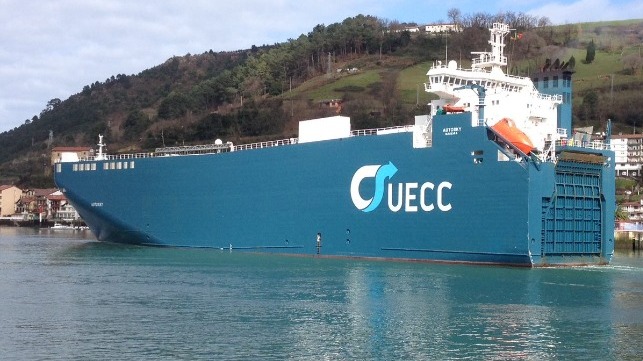Decarbonizing Legacy Vessels With Biofuels

Car and truck carrier UECC is running the PCTC Auto Sky on CO2-free, sustainable biofuel made from spent fast-food cooking oil. By giving this otherwise unusable waste a place in the value chain, UECC is contributing to the creation of a circular economy, with carbon-neutral transport as the result.
The carbon reduction resulting from the 6,200 tons of biofuel consumed by Auto Sky is around 20,600 tons of CO2, or a 60 percent reduction in carbon intensity compared to conventional heavy fuel oil - far ahead of the IMO target of 40 percent by 2030.
The biofuel feedstock, provided by Dutch supplier GoodFuels, is certified sustainable by the International Standard on Carbon Certification (ISCC) and has full accreditation from the Roundtable on Sustainable Biomaterials (RSB). These certifications guarantee that it does not come from an environmentally disruptive source and cannot be used for food or any other higher quality purpose. The fuel is the lowest commercial grade, combustible only in giant ships’ engines.
Old becomes new again
Auto Sky is 20 years old, but she has a good ten years of life ahead of her, proving that legacy tonnage can be made carbon-neutral. For UECC to make the switch to biofuel on this particular vessel, all that was required was to clean out the tanks.
“The point is to do what you can now with what you have,” says Daniel Gent, Energy & Sustainability Manager at UECC. “We want to prove that the marine community can begin to decarbonize right now. Practically any vessel that runs on marine fuels can run on biofuel, allowing the ship to run clean for the rest of its life.”
Now governments need to pick up their end, Gent says. “Right now this green fuel is made more affordable through public support schemes, which need to be expanded until the market reaches critical mass. We would run the entire fleet on biofuel if we could, and cargo owners are eager to transport their products on low-carbon ships in order to meet their own goals of a reduced environmental footprint. If all stakeholders work together, we can decarbonize much of the existing fleet,” he says.

that matters most
Get the latest maritime news delivered to your inbox daily.
UECC has also started sourcing bio-methane from urban waste streams in order to fuel their newer, gas-fueled vessels. “We want to prove that marine transport can be decarbonized, and we invite all stakeholders to join us on this journey,” says UECC CEO Glenn Edvardsen.
Bjorn O. Gran Svenningsen is Director of Sales & Marketing at UECC.
The opinions expressed herein are the author's and not necessarily those of The Maritime Executive.
